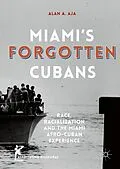This book explores the reception experiences of post-1958 Afro-Cubans in South Florida in relation to their similarly situated "white" Cuban compatriots. Utilizing interviews, ethnographic observations, and applying Census data analyses, Aja begins not with the more socially diverse 1980 Mariel boatlift, but earlier, documenting that a small number of middle-class Afro-Cuban exiles defied predominant settlement patterns in the 1960 and 70s, attempting to immerse themselves in the newly formed but ultimately racially exclusive "ethnic enclave." Confronting a local Miami Cuban "white wall" and anti-black Southern racism subsumed within an intra-group "success" myth that equally holds Cubans and other Latin Americans hail from "racial democracies," black Cubans immigrants and their children, including subsequent waves of arrival and return-migrants, found themselves negotiating the boundaries of being both "black" and "Latino" in the United States.
Autorentext
Alan A. Aja is Associate Professor in the Department of Puerto Rican and Latino Studies at Brooklyn College, the City University of New York, USA. His individual and collaborative publications have appeared in a range of scholarly and public outlets, including Ethnic Studies Review, Social Research, Latino/a Research Review, Souls: A Critical Journal of Black Politics, Culture and Society, Dissent, The American Prospect, The Washington Post, The Nation, and New Politics. His research focuses on intra-Latinx racism, stratification economics, wealth inequality, educational inequities, economic democracy, and grassroots to policy-level responses to inter-group disparities. Prior to academia, Aja worked as a labor organizer in Texas.
Inhalt
